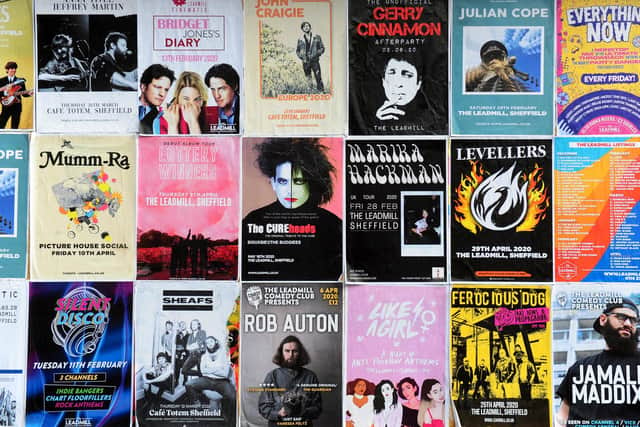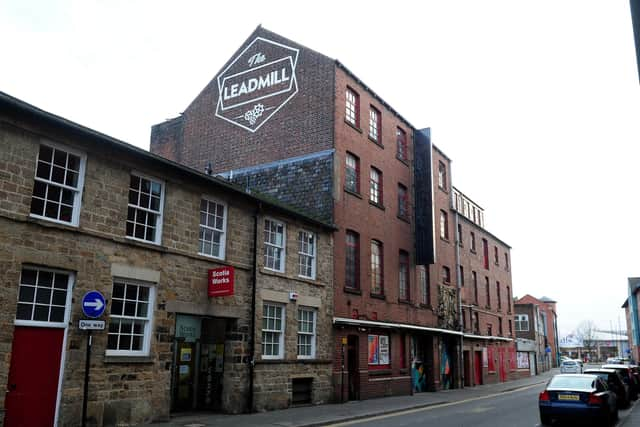Why Sheffield's music scene will be one of the worst affected in the UK by coronavirus
and live on Freeview channel 276
“I know of many smaller venues and promoters that won't survive – it will destroy them financially because most at grassroots level operate on a shoestring, being successful to them means earning just enough to pay the bills. A huge amount were struggling before this crisis so to have two, three or four months of gigs cancelled or at the very best postponed, is going to be disastrous.”
Figures suggest Sheffield, with its heritage of big homegrown acts like Arctic Monkeys, Pulp and Bring Me The Horizon, will be one of the places hardest hit by the need to pull shows following the Government's decision to impose a lockdown shutting pubs, clubs and theatres in a bid to curb the spread of Covid-19.
Advertisement
Hide AdAdvertisement
Hide AdThe online entertainment guide The List has ranked the top 10 UK towns and cities whose music scenes will be worst affected by the outbreak. Sheffield is in sixth place, above Manchester and Birmingham – just over 11 per cent of the city’s annual events are gigs, the magazine’s analysis found, a proportion more than five per cent higher than the national average.
It comes after a report published in December calculated that, in a normal year, more than 800,000 people go to live music events in Sheffield and its surrounding towns. Over 300,000 of these concertgoers come from elsewhere in the country – such 'music tourists' are worth £92 million to the region. Meanwhile just over £38 million was spent on tickets for live music in the city region in 2017, the most recent year for which figures were available.
The problem for venues, Chris says, lies with the uncertainty of the situation. Festivals with one-off fixed dates such as Glastonbury and Womad can simply cancel, albeit at great expense, whereas promoters handle lists of events running for months in advance. One of the highest-profile concerts in Sheffield this spring, Harry Styles’ show at the FlyDSA Arena, has been moved all the way to March 2021.
“I started rescheduling shows before the lockdown came into place because no-shows – people who'd bought tickets but didn't turn up for the gig – were increasing rapidly, which told me people were getting increasingly uncomfortable with the situation,” says Chris.
Advertisement
Hide AdAdvertisement
Hide Ad“Then the lockdown was introduced so I postponed/rescheduled all April gigs, but the situation was getting worse and May gigs were starting to look unlikely so I postponed/rescheduled all those. Time will tell if June gigs will have to be pulled and then July… not knowing makes planning ahead very difficult and I can see us having to reschedule already rescheduled gigs. We're trying to keep many plates spinning but, as time goes on, more crash to the floor.”


The Leadmill, Sheffield's nationally-renowned club in the city centre, was meant to be spending all of this year marking its 40th anniversary, with special events planned to mark the milestone. Instead, for the time being, the doors are closed and staff have been furloughed.
“All of our events will be cancelled for the foreseeable future until it is once again safe for us to open,” the venue’s team said on Facebook soon after the Government announced its radical Coronavirus Job Retention Scheme, which will pay up to 80 per cent of workers’ wages.
“This is very tough for us as, historically, we have always found a way to stay open during tough times, even in the worst conditions, including freak snowstorms and the awful floods of 2007, however we know this is the correct decision by the Government for the safety and survival of our beloved Sheffield.”


Advertisement
Hide AdAdvertisement
Hide AdDespite the help its employees have been offered, The Leadmill emphasised that 2020 will still be an ‘incredibly tough year’ with ‘major losses in revenue’. The club has been selling new 40th anniversary merchandise, including T-shirts, sweaters, tote bags and hoodies, to bring in income online.
“There are going to be far too many small independent venues, bars, cafes, restaurants and shops struggling in this terrible period so please do keep them in mind when you venture back out. They are the heart and soul of our wonderful city and must be preserved at all costs. We will be coming back harder and stronger than ever.”
Chris, who has been putting on gigs for more than 30 years – including more than a decade running The Boardwalk until its closure in 2010 – says the pandemic will affect all parts of the music business; the jobs of sound engineers, artists, agents and door staff are all at stake.
“I've been surprised at how supportive and helpful people are being in what is often an incredibly nasty business – perhaps knowing we're all in this together helps,” says Chris.


Advertisement
Hide AdAdvertisement
Hide Ad“As for the future? I don't know, but I'm positive and to be honest extremely excited about what happens when all this is over. Obviously live music needs audiences, without them venues wouldn't exist, and thankfully the hundreds of emails, texts and phone calls I've had from fans tells me their enthusiasm for the live experience isn't diminishing. It lifts our moods, it entertains and it inspires. We must remain positive.”
Northern towns and cities overwhelmingly topped The List's table. Wigan, Leeds, Leicester, Dudley and Nottingham were placed ahead of Sheffield – nearly a quarter of Wigan's annual events are live gigs, 17.5 per cent above the national average. Manchester, Wolverhampton, Bristol and Birmingham occupied the seventh to tenth positions.
Brendan Miles, the magazine’s director of data and content, said: “It is an unprecedented time for the cultural sector in the face of the pandemic and there is not a city or town in the UK unaffected by the coronavirus. Some areas, however, will be hit harder than others. While there are a small number of future tours still being announced, the reductions we are seeing in volume are exceptional.”
A message from the Editor:
Thank you for reading this story on our website. While I have your attention, I also have an important request to make of you.
With the coronavirus lockdown having a major impact on many of our advertisers - and consequently the revenue we receive - we are more reliant than ever on you taking out a digital subscription.


